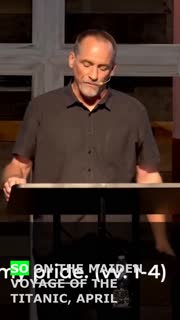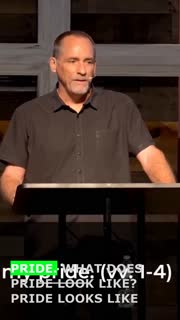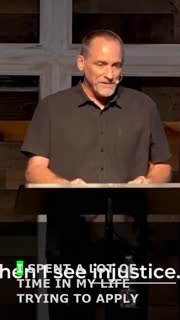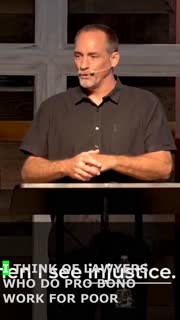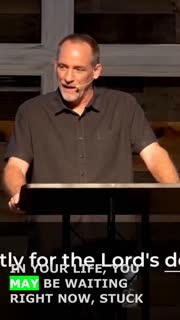Lessons from Obadiah: Pride, Justice, and Restoration
Devotional
Sermon Summary
Bible Study Guide
Sermon Clips
1) "So on the maiden voyage of the Titanic, April 12th, 1914, it hit an iceberg and went down. There were approximately 2,224 passengers on board. Only 706 survived. Over 1,500 died. Why? Because of pride. Because of pride, the ship was ruined and all those who went along for the ride were devastated. and most of them died. And I looked at that, and I thought, how much is this like a prideful person? Someone who declares that they have no flaws, and they build their plans, and they live an overinflated view of themselves, and they end up shipwrecking their own lives and hurting those around them." [10:30] (48 seconds)
2) "Pride. What does pride look like? Pride looks like the spouse who just can't admit that they are wrong. Don't elbow your spouse. That would be wrong in church. Pride is a friend who refuses to apologize even though they hurt you, and they know it. Pride is the braggart who ruins his friend group because all he talks about is himself, and the group falls apart. Pride is the opportunist who sees no fault in his investment plan, and then promptly loses his friend's money. Pride is the workmate who thinks that they know everything, and they're glad to tell you it. They're glad to push their opinion on you. Pride is the relative who's always criticizing someone else as if they themselves have no flaws and can do no wrong. Pride is that person who always uses themselves as the example of what is good and right and true." [12:59] (62 seconds)
3) "I spent a lot of time in my life trying to apply God's word to myself as a pastor. I was a full-time pastor for quite a few years. And I thought if I could travel in time and go back to certain eras, what would I have done as a pastor then? What would I have done or said about slavery if I was a pastor in those days? Would I say anything? Would I justify not doing anything? Or would I be like the majority who said they aren't even people? What's the big deal? What if I was a pastor in the period of our country when the Native Americans were being slaughtered? Would I have done anything? Would I have said anything? Or would I have been like the majority of the pastors who said those are savages? They're just pagans. What about if I was a pastor during the time of the brutality of the KKK? Would I speak up to the risk of my own life?" [15:10] (61 seconds)
4) "I think of lawyers who do pro bono work for poor people who can't afford to be represented in a court of law. I think of those who report a superior who is unjustly targeting a workmate. I think of kids at school who will turn in a bully who's terrorizing somebody else. What does intervention look like today? Those are things I think about. I think about the called to care ministry that operates out of the basement of our older section of the building here. And if you don't know about called to care, you will, but by the time I get done, I talked with Sherry Chapman, one of the founders of that yesterday at the Helmar Palooza. My mom says, what's a Palooza? I said, I have no idea. I have no idea." [17:38] (52 seconds)
5) "In your life, you may be waiting right now, stuck in the period in between when the leaves were blooming, I'm sorry, when the leaves were growing and the flowers have yet to come, and you're standing there in your life looking at bare ground, and you're wondering if your life is ever going to bloom again. You're trying to wait patiently on the Lord, but it's hard. You're trying to hang on to God's hope for restoration. But all you see is bare earth where green leaves once grew. You know, when Obadiah wrote this, the restoration of Israel was decades away. But he was encouraging the people of God to trust in the Lord." [29:10] (54 seconds)
Ask a question about this sermon
2) "Pride. What does pride look like? Pride looks like the spouse who just can't admit that they are wrong. Don't elbow your spouse. That would be wrong in church. Pride is a friend who refuses to apologize even though they hurt you, and they know it. Pride is the braggart who ruins his friend group because all he talks about is himself, and the group falls apart. Pride is the opportunist who sees no fault in his investment plan, and then promptly loses his friend's money. Pride is the workmate who thinks that they know everything, and they're glad to tell you it. They're glad to push their opinion on you. Pride is the relative who's always criticizing someone else as if they themselves have no flaws and can do no wrong. Pride is that person who always uses themselves as the example of what is good and right and true." [12:59] (62 seconds)
3) "I spent a lot of time in my life trying to apply God's word to myself as a pastor. I was a full-time pastor for quite a few years. And I thought if I could travel in time and go back to certain eras, what would I have done as a pastor then? What would I have done or said about slavery if I was a pastor in those days? Would I say anything? Would I justify not doing anything? Or would I be like the majority who said they aren't even people? What's the big deal? What if I was a pastor in the period of our country when the Native Americans were being slaughtered? Would I have done anything? Would I have said anything? Or would I have been like the majority of the pastors who said those are savages? They're just pagans. What about if I was a pastor during the time of the brutality of the KKK? Would I speak up to the risk of my own life?" [15:10] (61 seconds)
4) "I think of lawyers who do pro bono work for poor people who can't afford to be represented in a court of law. I think of those who report a superior who is unjustly targeting a workmate. I think of kids at school who will turn in a bully who's terrorizing somebody else. What does intervention look like today? Those are things I think about. I think about the called to care ministry that operates out of the basement of our older section of the building here. And if you don't know about called to care, you will, but by the time I get done, I talked with Sherry Chapman, one of the founders of that yesterday at the Helmar Palooza. My mom says, what's a Palooza? I said, I have no idea. I have no idea." [17:38] (52 seconds)
5) "In your life, you may be waiting right now, stuck in the period in between when the leaves were blooming, I'm sorry, when the leaves were growing and the flowers have yet to come, and you're standing there in your life looking at bare ground, and you're wondering if your life is ever going to bloom again. You're trying to wait patiently on the Lord, but it's hard. You're trying to hang on to God's hope for restoration. But all you see is bare earth where green leaves once grew. You know, when Obadiah wrote this, the restoration of Israel was decades away. But he was encouraging the people of God to trust in the Lord." [29:10] (54 seconds)
